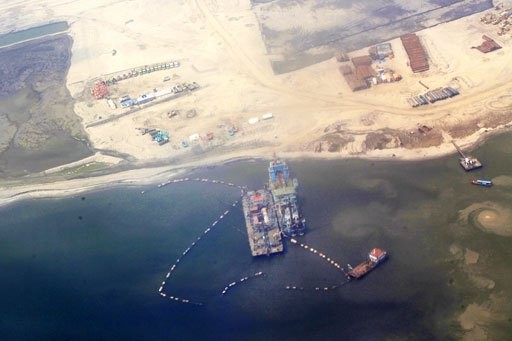Popular Reads
Top Results
Can't find what you're looking for?
View all search resultsPopular Reads
Top Results
Can't find what you're looking for?
View all search resultsRethinking the seawall
According to estimates from environmental watchdogs and researchers, the GSW megaproject would cost some Rp 207 billion (US$13.3 million) in potential economic losses in the fisheries sector every year
Change text size
Gift Premium Articles
to Anyone
O
n Jan. 10, Defense Minister Prabowo and his allies in President Joko “Jokowi” Widodo’s administration put forward the idea of fast-tracking the construction of a giant seawall (GSW) along Java’s northern coastline.
The project was drummed up as the central government’s preferred solution to land subsidence, which has plagued a part of the country that has seen intense infrastructure development and blossoming economic activities.
However, we must point out three glaring problems with the suggestion, especially if we consider the big picture.
On a practical level, it may seem fair to assume that the government merely wants to protect national economic interests at a time when rising sea levels have become a challenge to the world’s archipelagic and island states.
If implemented carefully and correctly, the sea dikes may or may not be able to shield Java’s northern coastline region known as Pantura from tidal floods and prevent the country’s de facto economic hub from sinking.
As we know, there are 70 industrial areas and five special economic zones (SEZs) located thereabouts.
However, the solution skirts the core issue that causes land subsidence in the first place, which is the over-extraction of groundwater that comes from establishing centers of industrial and economic activities.
Case studies in Japan and Thailand have shown that simpler policies putting an end to such practices are much more effective at slowing land subsidence. You do not see anything giant safeguarding the coasts of those two nations.
Then there is the potential loss of marine biodiversity and economic losses from blue economy pillars like fishing.
According to estimates from environmental watchdogs and researchers, the GSW megaproject would cost some Rp 207 billion (US$13.3 million) in potential economic losses in the fisheries sector every year, with the assumption that it displaces crucial marine ecosystems.
Coordinating Economic Affairs Minister Airlangga Hartarto might be able to wave away these problems by saying that the necessary ecological studies have been undertaken.
But when was the last time the government actually did anything right for the environment on such a large scale?
And this is to say nothing about the government’s commitment to developing regions outside of Java.
From a cost analysis standpoint, the GSW project is not cheap. Prabowo suggested it could cost up to $60 billion.
That is nearly twice as expensive as the Nusantara new capital city project (IKN), which costs $35 billion and has not even started generating any tangible returns.
The GSW project, in an earlier iteration, relied on 100 percent private-sector funding, but now it seems the only way forward is for the government to dip its fingers into state and regional coffers, not necessarily the most ethically sound option to choose during a political year.
By making the project an interregional endeavor, officials may argue that the collective burden-sharing would eventually translate into collective monetary returns, but the same could be said about the misappropriation of funds.
The last point is perhaps the most contentious because the call to fast-track the GSW project can so easily be construed as political.
There really is nether rhyme nor reason as to why the defense minister would be the one to lead this endeavor, which is why Prabowo and Airlangga’s roles must be seen through the lens of the upcoming elections.
As the presidential candidate campaigning on a platform of continuity, and backed by the leader of the traditional establishment party that is Golkar, it is hard to see the GSW pitch as anything more than a campaign promise.
That is a questionable use of state authority for political gain, at the expense of other candidates.
We believe it is better to rethink the project’s motivation and only decide on it after a new government is sworn in.











